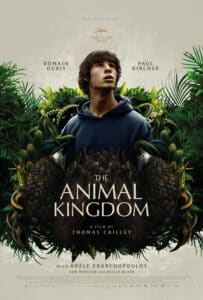
The Animal Kingdom
François has just taken his son Émile to a medical visit. Then he is stuck in traffic when a van carrying mysterious creatures derails. François’s wife was also there and, like many other individuals, she began to transform into an animal. The man and the boy thus set out to find her and are helped by a policewoman. In the meantime, the first signs of the mutation also appear in Émile.
His name is Paul Kircher, he plays Émile, and his enormous talent had already been seen in Le lycéen. Even in Christophe Honoré’s film there was a scene in which the boy is in the car with his father. In that case it was one of the last moments spent together before the man’s disappearance. Here, however, is the only place where the two protagonists can be protected from the danger that exists outside. But it is also where they find, even if only for an instant, a moment of engaging sharing like in the scene where they scream happily listening to a song.
It is precisely the chemistry between Kircher and Romain Duris that is one of the strong points of The Animal Kingdom, which marks Thomas Cailley’s return to directing nine years after the great debut of The Fighters – Life training.
There the protagonist, Madeleine (played by Adèle Haenel), was preparing for the end of the world. Here there is certainly the atmosphere of an imminent end but it does not have the forms of disaster cinema. Instead, there are two parallel universes that collide or communicate with each other. This is why Thomas Cailley looks but at the same time seeks a different path in the genre.
On the one hand there is the hunting of creatures who have transformed from humans to animals by the authorities where the different is seen as a danger and in which the film could underline, precisely from a political point of view, the fear of every form of integration. On the other hand, however, there is the discovery of a new universe, a parallel world that can coexist in the present with the real one as in the gaze of James Cameron in the two Avatars. In fact, there is a scene, in the woods at night, in which Émile searches for his own image in the water. There he understands his dual nature but also a new freedom that explodes in the enthralling finale before the epilogue.








